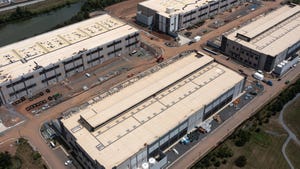Cloud Computing as an Energy Saving ToolCloud Computing as an Energy Saving Tool
Cloud computing presents a compelling opportunity to reduce data center power bills, according to Jonathan Koomey, a leading expert on IT power issues. Koomey discussed cloud computing and energy issues at the Uptime Institute Symposium 2010 today in New York.
May 17, 2010

jon-koomey
Data center energy expert Jonathan Koomey discusses cloud computing at the Uptime Institute Symposium 2010 Monday in New York.
As the data center industry grows increasingly obsessed with energy efficiency, cloud computing presents a compelling opportunity to reduce data center power bills, according to a leading expert on IT power issues.
"There are powerful economic factors pushing us towards cloud computing," said Jonathan Koomey , a researcher who has studied data center energy use at Stanford and Lawrence Berkeley National Labs. "One of the major reasons is the more efficient use of power by cloud computing providers."
Koomey spoke about the power advantages of cloud computing this morning at the Uptime Institute Symposium 2010 in New York. The three-day event brought together more than 1,800 industry professionals at the New York Hilton.
"Enormous Advantages"
In a nutshell, cloud companies like Microsoft, Google and Amazon can process the same workload with a lot less power than companies can in their in-house data centers. "The power related costs in data centers are growing in importance over time," said Koomey, widening the gap in efficiency - and cost - between in-house data centers and cloud platforms.
"There will still be a role for conventional data centers,but I believe that role will diminish over time," said Koomey. "The economic advantages of shifting to a cloud infrastructure are so enormous that current challenges (in cloud adoption) will be overcome and there will be a major shift to cloud computing."
Koomey cited four areas where cloud computing has power efficiency advantages:
Diversity: Spreading computing loads across many users and time zones can improve hardware utilization.
Economies of Scale: Computation is cheaper in a large shop than small shop, Koomey said, as fixed costs can be spread over more servers and users.
Flexibility: The management of virtual servers in cloud apps is easier and cheaper than managing physical servers, Koomey said. It also has reliability advantage that can create savings in the data center. If you can void outages using software to route around problems, you don't need to buy two power supplies for each server.
Enabling Structural Change: The shift to a cloud model enables broader efficiencies in a business that can save money over time.
Many data centers continue to operate in ways that fail to acknowledge the growing importance of power. " You have people charging by the square foot for data center, even though 90 percent of their costs are related to power," said Koomey. This practice is changing among the largest data center developers, as we noted in Data Center Leasing: It's All About the Megawatts.
Koomey said the power advantages of the cloud could become more pronounced should the U.S. government adopt carbong regulation. "Carbon taxes are generally not on the radar screen," said Koomey. "There will be a price for carbon, and carbon will have an impact on where you locate your data centers."
About the Author
You May Also Like







